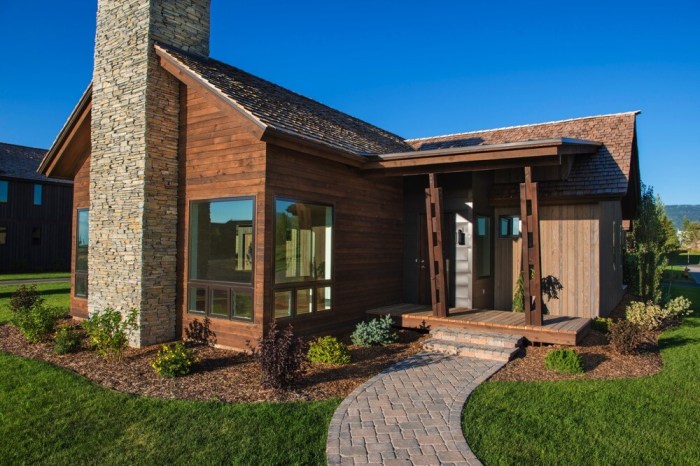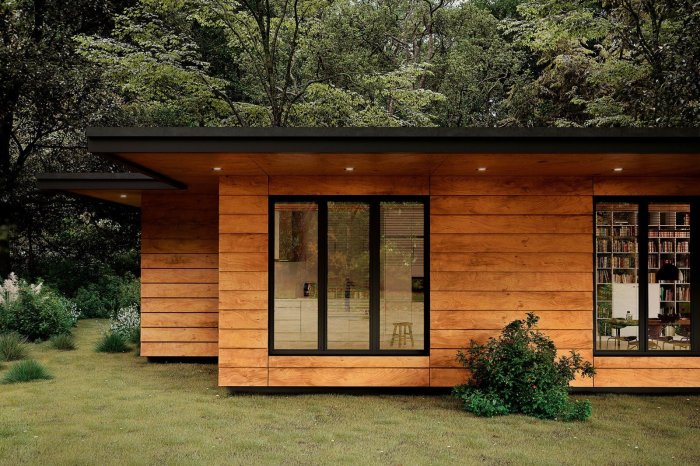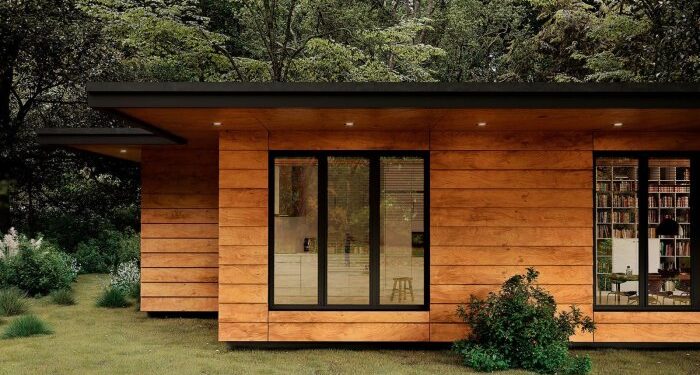Embark on a journey through the world of natural wood siding houses, where timeless elegance meets modern design. Learn about the rich history and practical advantages of incorporating natural wood into your home's exterior.
Discover the art of blending nature with architecture as we delve into the different types of wood used for siding and the stunning design options available.
Introduction to Natural Wood Siding Houses

Natural wood siding is a type of exterior cladding made from real wood that is used to cover and protect the exterior walls of a house. It provides a warm and classic look to homes, enhancing their aesthetic appeal.
There are several benefits to using natural wood siding on houses. Firstly, it is a renewable and sustainable material, making it an environmentally friendly choice. Additionally, wood siding is durable and can withstand the elements when properly maintained. It also provides natural insulation, helping to regulate the temperature inside the house.
Types of Wood Commonly Used for Siding
- Cedar: Known for its natural resistance to decay and insects, cedar is a popular choice for wood siding. It has a rich color and distinctive grain pattern.
- Pine: Pine is a cost-effective option for wood siding and can be easily painted or stained to achieve the desired look. However, it is not as durable as cedar.
- Redwood: Redwood is a high-end option for wood siding, prized for its beauty and natural resistance to decay. It is a more expensive choice but offers exceptional longevity.
Installation of Natural Wood Siding
When it comes to installing natural wood siding on a house, there are several key steps to follow to ensure a successful and visually appealing outcome. Additionally, using the right tools and materials is crucial for a durable installation that will stand the test of time.
Typical Process of Installing Natural Wood Siding
The process of installing natural wood siding typically involves the following steps:
- Prepare the surface by removing any existing siding or trim, and ensure the wall is clean and free of debris.
- Install a weather-resistant barrier, such as building paper or house wrap, to protect the underlying structure from moisture.
- Measure and cut the wood siding to fit the dimensions of the wall, making sure to leave room for expansion and contraction.
- Attach the siding to the wall using nails or screws, making sure to follow the manufacturer's guidelines for spacing and fastening.
- Finish the installation by adding trim pieces around windows, doors, and corners for a polished look.
Tools and Materials Needed for Installation
Before starting the installation process, gather the following tools and materials:
- Wood siding panels
- Nails or screws
- Hammer or nail gun
- Tape measure
- Saw for cutting the siding
- Level
- Caulk and caulking gun
- Weather-resistant barrier
Tips for Ensuring a Durable and Visually Appealing Installation
For a long-lasting and visually pleasing natural wood siding installation, consider the following tips:
- Choose high-quality wood siding that is treated or naturally resistant to rot and insects.
- Properly seal the ends and edges of the siding to prevent water infiltration and damage.
- Follow the manufacturer's instructions for installation to ensure proper spacing and fastening.
- Regularly inspect and maintain the siding to address any issues before they escalate.
Maintenance and Care for Natural Wood Siding
Proper maintenance is crucial to ensure the longevity and beauty of natural wood siding. By following a few key steps, you can protect your siding from weather damage and pests, ultimately saving you time and money in the long run.
Regular Cleaning and Inspection
- Regularly clean the siding with a mild detergent and water to remove dirt, grime, and mold.
- Inspect the wood for any signs of rot, warping, or insect damage, and address any issues promptly.
- Trim back any vegetation near the siding to prevent moisture buildup and pest infestations.
Protective Measures
- Apply a quality wood sealant or stain to protect the wood from UV rays, moisture, and pests.
- Ensure proper ventilation behind the siding to prevent moisture buildup and mold growth.
- Consider installing gutters and downspouts to direct water away from the siding.
Regular Maintenance and Repairs
- Regularly repaint or reseal the siding as needed to maintain its protective coating.
- Replace any damaged or rotting boards to prevent further deterioration of the siding.
- Keep an eye out for signs of pest infestation, such as termite tunnels or woodpecker holes, and take appropriate action.
Design Ideas and Styles for Natural Wood Siding Houses
When it comes to designing a house with natural wood siding, there are several creative options to consider. From traditional to modern styles, wood siding can add warmth and character to any home exterior.
Exploring Different Design Options
One popular design idea is to use vertical wood siding to create a sleek and modern look. Horizontal siding, on the other hand, can give a more traditional and rustic appearance. Mixing different widths of wood planks can also add visual interest to the exterior of the house.
Mixing and Matching Wood with Other Materials
To achieve a unique look, consider combining natural wood siding with other materials such as stone, brick, or metal. This can create a striking contrast and provide a more dynamic texture to the overall design. For example, pairing wood siding with stone accents can create a rustic yet elegant facade.
Popular Architectural Styles Featuring Wood Siding
- Craftsman Style: Known for its emphasis on natural materials and handcrafted details, the Craftsman style often incorporates natural wood siding to enhance its traditional charm.
- Modern Farmhouse: This popular style combines the simplicity of modern design with the warmth of farmhouse elements, making natural wood siding a key feature in achieving the desired aesthetic.
- Log Cabin: While traditionally associated with rustic cabins, log home architecture can also be adapted to modern designs by using natural wood siding for a contemporary twist on a classic look.
Final Review

As we conclude our exploration of natural wood siding houses, remember that the beauty of wood lies not only in its aesthetics but also in its durability and sustainability. Embrace the warmth and character that natural wood brings to your home, creating a space that is both inviting and environmentally friendly.
FAQ Corner
How often should natural wood siding be painted or stained?
Natural wood siding should typically be painted or stained every 3-7 years to maintain its appearance and protect it from the elements.
Can natural wood siding be pressure washed?
Yes, but it should be done carefully with low pressure to avoid damaging the wood. It's best to consult a professional for guidance.
What is the average lifespan of natural wood siding?
With proper maintenance, natural wood siding can last anywhere from 20 to 40 years, depending on the type of wood and climate conditions.
Is it possible to change the color of natural wood siding?
Yes, natural wood siding can be painted or stained in different colors to suit your desired aesthetic. Ensure proper preparation for a lasting finish.













